Learning and knowledge sharing are fundamental to the LHSS Project. We invite you to search LHSS knowledge products and resources for the latest approaches, insights, and learning in the field of integrated health systems strengthening.
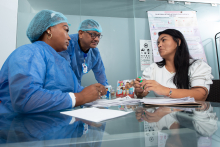
Through her leadership, Giselle Cardona, a 38-year-old nurse, helped Cartagena expand the number of health centers providing care for pregnant women from 9 to 45. As the Director of the El Pozón Subnetwork, Giselle worked tirelessly to improve the quality of maternal care and reduce risks associated with maternal mortality. Her collaboration with LHSS Colombia played a key role in strengthening health services for pregnant women, regardless of nationality.
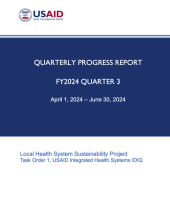
This Year 5 Quarter 3 Report (Apr-Jun 2024) was prepared for USAID and provides a progress update for all annual work plan activities.
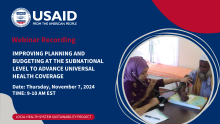
In this webinar, representatives from Tanzania and Timor-Leste, along with WHO and LHSS panelists, discussed strategies for strengthening subnational public financial management systems to align with health sector needs, enhance partnerships, and improve community resource efficiency.
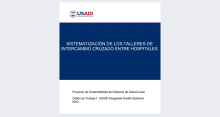
The report highlights the key aspects and lessons learned in managing severe COVID-19 cases through a series of exchange workshops. These workshops, coordinated by the Deputy Management of Hospitals of the National Health Service and the Regional Health Directorates, aimed to facilitate cross-learning among hospitals that participated in the first two phases of training. The focus was on gathering evidence about the training process, assessing the applicability of various concepts and techniques, and providing recommendations for managing severe COVID-19 cases in intensive care units.
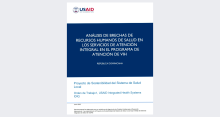
In view of the incorporation and standardization of community services at the level of the Comprehensive Care Services (SAI), LHSS in coordination with the National Health Service (SNS) worked to advise and evaluate the needs of human resources in health for the provision of quality services and coverage of the needs of patients both at the site level and at the community level for the implementation of a human resources plan. To this end, the first step was to analyze the gap in quantitative and capacity terms to support at the central level with the development of provincial human resources plans to close gaps and deliver the portfolio of necessary services.
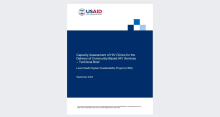
The provision of HIV care services in the Dominican Republic largely consists of service provision at clinical sites. Although some of these sites have incorporated community-based patient follow-up into their HIV service portfolio, the Government of the Dominican Republic (GoDR) has only recently incorporated community-based HIV services into the regulatory framework of the national HIV care program. In doing this, the GoDR aims to expand the delivery of community-based HIV services in a sustained and phased manner. Thus far, the new strategy has been implemented primarily in clinical sites supported by the U.S. President’s Emergency Plan for AIDS Relief (PEPFAR), with the financial support of PEPFAR-funded care and treatment projects.
During its first and second year of implementation, the LHSS has supported GoDR to expand its plan for community-based HIV services nationwide. To that end, LHSS has worked with GoDR counterparts to review, develop, update, and implement a comprehensive policy framework— including national guidelines and standard operating procedures (SOPs)—that supports the provision of HIV care at both clinical sites and the community level.

The current Health System in the Dominican Republic is the result of significant reforms over the past two decades, guided by the Ten-Year Health Plan (2006-2015) and the National Development Strategy 2030. It integrates services from the Ministry of Public Health and the Dominican Social Security Institute into a unified network to ensure health and social security for all citizens, led by the Ministry of Health. This feasibility assessment focusses on the Family-Based HIV Service Model in the Dominican Republic. The model addresses the needs of families with HIV-positive members by integrating clinical care with economic, social, and legislative support. It emphasizes accessibility, reducing stigma, and considering the emotional and mental health impacts.
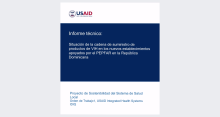
In 2010, through Ministerial Agreement 000019-2010, the MSP of the Dominican Republic, with technical and financial assistance from USAID, began the organization of the Single System for the Management of Medicines in Supplies (SUGEMI), with the aim of contributing to improving people's access to these products. SUGEMI began its activities in 2012 with the integration of the management of the supply of medicines and supplies used in the tuberculosis and HIV programs.
This report highlights the health network model established in the Dominican Republic for HIV prevention, diagnosis and health care services provided at the first level of care through specialized units called Comprehensive Care Services (SAI).
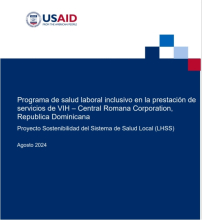
This report provides insight in the inclusive of the provision of HIV services, is to address the existing gap in the supply of health services related to HIV and other sexually transmitted infections (STIs) within the private workplace and in key populations. The target population of Central Roromana's HIV-inclusive workplace health program is mainly focused on their rural employment, specifically those employed in the field and agriculture. This demographic represents a high percentage of Haitian migrant employees and/or those of African descent. However, the coverage and provision of services outside the structure of the company's health program may be limited due to the vulnerabilities and limitations inherent to an irregular immigration status. To address this situation, the company has taken the initiative to hire a private insurance service for the enrollment of employees with irregular immigration status. This allows them to have health service coverage at other clinical sites in the province, thus ensuring that all employees have access to necessary medical care, regardless of their immigration status.
Tune in to the latest podcast by Jamaica's Ministry of Health and Wellness, where they discuss the launch of the One Health Project. In collaboration with the Ministry of Agriculture and private sector partners, and supported by LHSS Jamaica, this initiative addresses emerging health threats by uniting human, animal, and environmental health efforts.
Six hospitals across Bogotá, Cali, Cúcuta, Barranquilla, and Medellín were certified by Icontec (the Colombian Institute of Technical Standards) for implementing internal strategies to ensure health care services are provided without discrimination. This achievement, supported by LHSS Colombia, promotes quality and inclusive care that eliminates discrimination based on nationality, gender, ethnicity, social status, or disability.
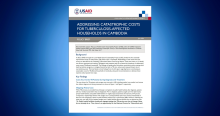
In 2023, USAID, through the Local Health System Sustainability Project (LHSS), funded the first nationally representative study on tuberculosis (TB) patient costs in Cambodia. Methodology of and results from the survey are described in the Cambodia Tuberculosis Patient Cost Survey Report Study aims were to (1) identify cost drivers associated with seeking TB diagnosis and treatment and (2) to assess the prevalence of catastrophic costs among TB-affected households.
The findings will guide policy formulation, particularly within existing social health protection programs, to mitigate financial barriers to TB care, and prevent impoverishment due to overwhelming costs. This brief details critical findings from the full report regarding factors contributing to catastrophic costs for TB-affected households in Cambodia, along with recommendations to alleviate these expenses and proposed next steps.
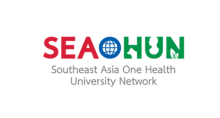
The Southeast Asia One Health University Network (SEAOHUN) 2024 International Conference takes place on September 18-19, 2024, at the Shangri-La Hotel in Chiang Mai, Thailand.
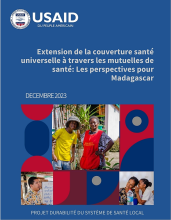
Le gouvernement de Madagascar s'est engagé à atteindre la couverture sanitaire universelle (CSU) à travers la mise en œuvre de la Stratégie nationale de financement de la santé de 2015. Cette stratégie prévoit d'accroître le financement national de la santé et de la protection financière des usagers des soins de santé. En mai 2022, le gouvernement a annoncé son intention de promouvoir le développement de l'assurance maladie de proximité (CBHI).
Pour répondre à cette nouvelle politique, l'Unité d'appui à la CSU, rattachée au Secrétariat général du ministère de la Santé publique, a initié un processus participatif de conceptualisation et de mise en œuvre d'un modèle de CBHI. Cette note technique présente des options pour la conception et la mise en œuvre de la phase de démonstration de CBHI prévue dans le district de Fénérive Est, en tenant compte des enseignements tirés des résultats de l'étude de faisabilité CBHI à Madagascar et des expériences que les pays d'Afrique subsaharienne, en particulier le Sénégal, ont eues avec CBHI. Cette note complète d'autres notes techniques que la LHSS a élaborées pour l'Unité d'appui à la CSU afin d'éclairer le processus d'établissement de la CBHI à Madagascar, notamment la Note technique sur le modèle de CBHI à Madagascar (LHSS 2022).
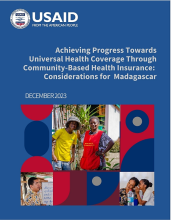
The Government of Madagascar is committed to achieving universal health coverage (UHC) through implementation of the 2015 National Health Financing Strategy. This strategy plans to increase domestic financing for health and for the financial protection of health care users. In May 2022, the government announced its intention to promote the development of community-based health insurance (CBHI). To respond to this new policy, the UHC Support Unit, attached to the General Secretariat of the Ministry of Public Health (MOH), has initiated a participatory process to conceptualize and implement a CBHI model. This technical brief presents options for the design and implementation of the demonstration phase of CBHI planned for Fénérive Est District, taking into consideration the lessons learned from the results of the CBHI feasibility study in Madagascar and the experiences that countries in sub-Saharan Africa—particularly Senegal—have had with CBHI.
This brief compliment other technical briefs that LHSS has developed for the UHC Support Unit to inform the process of establishing CBHI in Madagascar, including the Technical Note on the CBHI Model in Madagascar (LHSS 2022).
